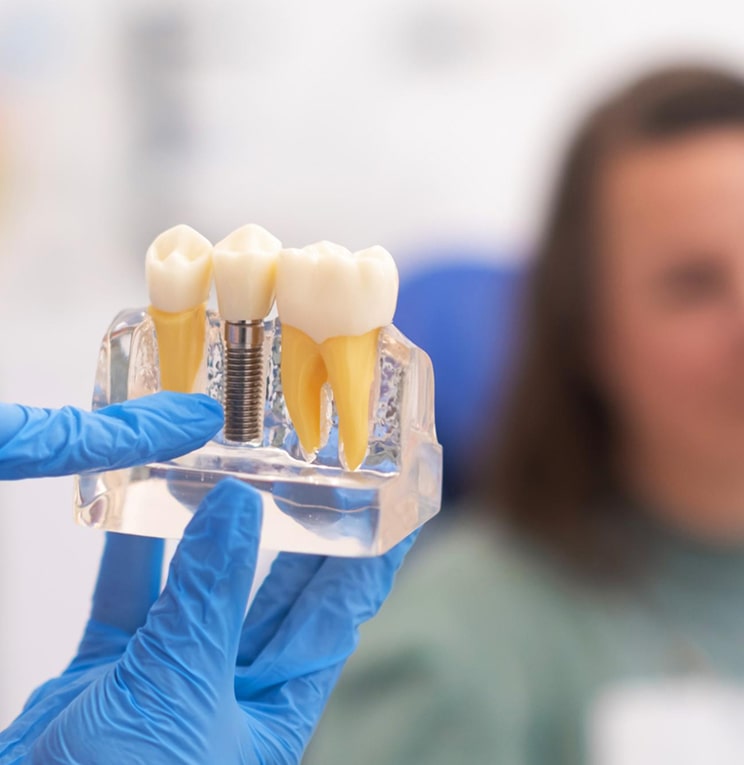
Embarking on the journey to restore your smile with dental implants can feel daunting — but it doesn’t have to be. With the right dental team guiding you, what looks like a long process actually delivers one of the strongest and most natural-feeling solutions available. At Arya Dental in Fullerton, CA, the implant process is clearly mapped out from start to finish.
In this blog, we’ll walk you through the entire timeline: what happens in each phase, how long it takes, what patients can expect (both clinically and practically), and how to prepare for each stage.
Phase 1: Consultation & Digital Evaluation
Everything starts with a detailed first appointment. At Arya Dental:
- Your full medical and dental history is reviewed.
- A comprehensive oral exam is done.
- High-resolution 3D digital imaging (such as cone beam CT) is used for precise mapping.
- Bone density & volume are assessed, to determine if there’s enough support for an implant.
Based on these findings you will be informed whether you’re ready for an implant right away or if preparatory steps (like bone grafting) are needed.
Phase 2: Personalized Treatment Plan
No two mouths are the same — Drs. at Arya map out your unique plan:
- They decide implant size, position, number of implants.
- If bone volume is insufficient, they’ll plan grafting.
- They cover timing: how long each step takes (consultation → placement → healing → restoration).
- Financials and support: payment plans, insurance options, and what to expect in terms of cost.
Phase 3: Implant Placement
When the time is right, the implant surgery is done:
- Using 3D guided technology, the dentist places the titanium post in the jawbone in the optimal location for both aesthetics and function.
- A small healing cap is placed over the site.
- Most patients return to work within 1–2 days (depending on complexity) and experience mild discomfort rather than major pain.
Post-op instructions will be given to minimize swelling/discomfort and protect the site.
Phase 4: Healing & Osseointegration
This is a key stage: the implant integrates with the bone.
- It usually takes between 3 to 6 months for osseointegration.
- During this time, you may have a temporary restoration (if aesthetics are a concern) while the implant heals.
- Regular follow-ups to monitor progress, check gum health and ensure everything is healing well.
- If bone grafting was done, the healing period may be extended.
Phase 5: Abutment & Final Crown Placement
Once healing is complete, the final phase begins:
- The implant is uncovered (if needed) and an abutment is placed.
- A custom-crafted crown is made to match your natural teeth in shape, size, color and function.
- The final restoration is attached, and at this point you’ll have a strong, natural-looking tooth.
This phase is where you literally “get your tooth back” — often with better performance than the original.
Phase 6: Ongoing Maintenance & Care
Your implant journey doesn’t end once the crown is placed — proper care makes all the difference for longevity.
- Brush twice daily with a soft toothbrush; use non-abrasive toothpaste.
- Floss daily, or use a water flosser around the crown/implant interface.
- Avoid chewing very hard items (ice, hard candy, pens) that could damage the crown or implant.
- If you have bruxism (teeth grinding) you should use a night guard to protect the implant and surrounding teeth.
- Schedule professional check-ups and cleanings twice a year (or as recommended). The implant should be inspected just like any natural tooth.
How long does it take, and what about cost/risk?
- On average, the full process takes 4 to 9 months (includes healing/integration).
- Cost varies depending on the number of implants, need for grafting, type of restoration, insurance, etc. Arya Dental offers flexible payment options and accepts most PPO insurances.
- Implants are highly successful (success rates over 95 %) when placed and maintained properly.
- Risks are low but include: failure of the implant to integrate, infection, bone loss, complications related to systemic health or smoking. Good hygiene and a healthy lifestyle mitigate these.
Final words: what you should ask your dentist
When you meet your implant dentist, here are some good questions:
- What kind of 3D imaging or guided surgery do you use?
- Will the entire treatment be done in-house (consultation, placement, restoration), or will I be referred out?
- How many implants have you placed, and what are your success/failure rates?
- If bone grafting is needed, what materials will you use and how will that affect timeline and cost?
- What does the long-term care regime look like for my implant?
- What payment/insurance options are available?
If your dentist can answer these clearly and confidently — like the team at Arya Dental — your journey toward a restored smile will be smooth, predictable and effective.